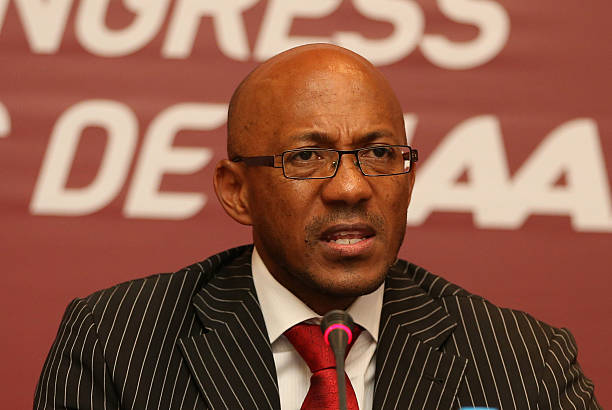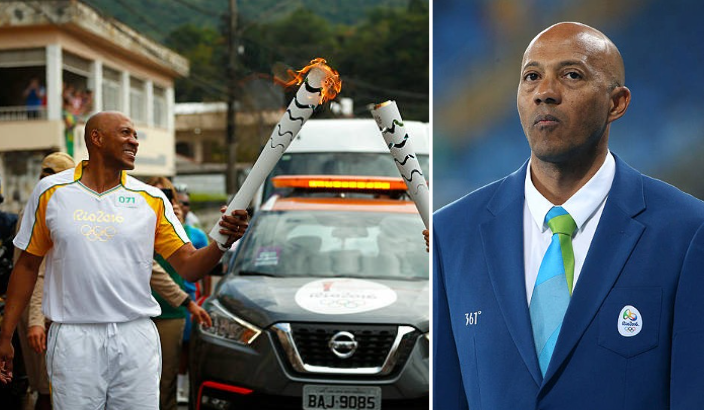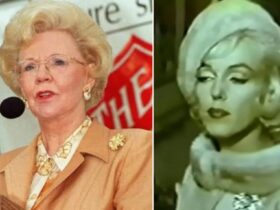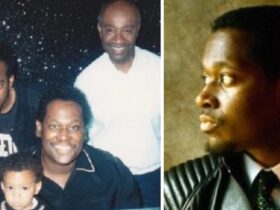Frankie Fredericks stands as one of Africa’s most remarkable athletes, a sprinter who carried the hopes of a nation and inspired millions around the world. Known for his lightning speed, grace, and humility, Frankie Fredericks made history on the global track scene, becoming a symbol of perseverance and pride for Namibia. His story is not only about medals and records but also about dedication, leadership, and the true spirit of sportsmanship.
Quick Bio
| Full Name | Frank “Frankie” Fredericks |
|---|---|
| Date of Birth | October 2, 1967 |
| Place of Birth | Windhoek, Namibia |
| Nationality | Namibian |
| Height | 1.84 meters (6 ft 0 in) |
| Weight | 75 kg (165 lbs) |
| Sport | Track and Field (Sprinting) |
| Main Events | 100 meters, 200 meters |
| Olympic Medals | 4 Silver Medals |
| World Championship Medals | Gold and Silver in 200m, Bronze in 100m |
| Education | University of Brigham Young (BYU), USA |
| Retired | 2004 |
| Notable Role | IOC Member, Athletics Leader |
| Famous Quote | “Hard work and belief can take you further than talent alone.” |
Early Life and Background

Born in Windhoek, Namibia, Frankie Fredericks grew up during a time when his country was still under South African rule. From a young age, he displayed extraordinary athletic ability and determination. Running barefoot on the dusty fields of his hometown, Fredericks discovered his love for sprinting. His early life was marked by modest beginnings, but his dreams reached far beyond the local tracks. After Namibia gained independence in 1990, Frankie would soon become the nation’s first major international sports star, symbolizing a new era of hope and unity.
Journey to Becoming a World-Class Athlete

Frankie’s athletic journey began to flourish when he received a scholarship to attend Brigham Young University (BYU) in the United States. There, he not only earned a degree in computer science but also honed his sprinting skills. Competing in collegiate events gave him exposure to advanced training methods and world-class competition. His determination to improve and represent his homeland on the global stage became stronger with each race.
It was during his time in the U.S. that Frankie began breaking national records and gaining recognition in the athletics community. His discipline, focus, and relentless pursuit of excellence made him a standout sprinter. By the early 1990s, he was ready to take on the world’s best.
Rise to Olympic Fame
The 1992 Barcelona Olympics marked the turning point in Frankie Fredericks’ career. Representing the newly independent Namibia, he made history by winning two silver medals—one in the 100 meters and another in the 200 meters. These achievements were not just personal victories but a national milestone.
Four years later, at the 1996 Atlanta Olympics, Fredericks repeated this incredible feat, again winning silver in both events. His consistent performance against legendary sprinters like Michael Johnson and Linford Christie established him as one of the most respected figures in world athletics. Although he never clinched Olympic gold, his name became synonymous with speed, resilience, and integrity.
Career Highlights and Major Achievements

Throughout his career, Frankie Fredericks accumulated an impressive list of achievements. In 1993, he won gold at the World Championships in Stuttgart, defeating the best in the world in the 200 meters. He also claimed silver medals at other major events, including the Commonwealth Games and African Championships.
Frankie held the African record for both the 100m and 200m for many years, and his times still rank among the fastest in history. His 200m personal best of 19.68 seconds was one of the fastest ever recorded at the time, proving his place among the elite sprinters of the modern era.
Frankie Fredericks and Namibia’s National Pride
For Namibia, Frankie Fredericks was more than an athlete—he was a national hero. As the first Namibian to win an Olympic medal, he became a symbol of what the nation could achieve on the world stage. His success brought international attention to a young country and inspired countless young athletes to dream beyond limitations.
Even today, his name carries deep emotional significance for Namibians. Schools, streets, and sports facilities have been named in his honor, celebrating his contribution not only to athletics but to national unity and pride.
Style of Running and Training Discipline
Fredericks was known for his explosive start, perfect form, and smooth acceleration. His training was rooted in discipline and precision, focusing on strength, endurance, and technique. He worked closely with top coaches to improve his stride mechanics and reaction time. Unlike some sprinters who relied purely on raw power, Fredericks combined speed with intelligence, making him a consistently top performer across multiple seasons.
His approach to training—structured, scientific, and detail-oriented—became a model for many upcoming African athletes seeking international success.
Challenges and Injuries
Like many elite athletes, Frankie faced challenges throughout his career. Injuries, particularly to his hamstrings, often threatened to derail his progress. However, his mental toughness and positive mindset kept him focused. Even when he missed competitions due to injuries, he used the time to study his performance, recover, and come back stronger.
Frankie’s story is one of perseverance—showing that champions are not defined by the medals they win, but by how they rise after setbacks.
Life After Retirement
After retiring in 2004, Frankie Fredericks transitioned from the track to leadership and mentorship roles. He became actively involved in sports administration, serving as a member of the International Olympic Committee (IOC) and other athletics bodies. His mission was to promote fair play, integrity, and development within global athletics.
He has also worked on programs that empower young athletes in Namibia and across Africa, helping them access better training facilities, education, and opportunities. His post-retirement life reflects his commitment to giving back and building the next generation of champions.
Frankie Fredericks’ Legacy in Athletics
Few athletes have left a legacy as impactful as Frankie Fredericks. His records, sportsmanship, and leadership continue to influence the world of athletics. He opened the door for future African sprinters and proved that athletes from smaller nations could compete with the best.
Today, many sprinters cite him as a source of inspiration. His journey from Windhoek’s dirt tracks to the Olympic podium demonstrates that hard work and self-belief can overcome any obstacle.
Leadership and Contribution to Global Sports
Beyond his running career, Fredericks has played an instrumental role in shaping modern athletics. As an IOC member, he has participated in key decisions about global sports governance, ensuring transparency and equality. He has also supported youth development initiatives through organizations that nurture talent at the grassroots level.
His leadership style—rooted in humility and fairness—has earned him respect from athletes and officials worldwide. Frankie continues to champion causes related to education, anti-doping awareness, and ethical leadership in sports.
Personal Life and Values
Away from the spotlight, Frankie Fredericks is known for his quiet, thoughtful nature. He values family, education, and community. Despite his global fame, he remains grounded and connected to his roots in Namibia. His values of honesty, perseverance, and compassion are guiding principles that influence both his personal and professional life.
Inspiration to Future Generations
For many young athletes, Frankie Fredericks is a role model who proves that success comes from discipline, not shortcuts. His life story continues to motivate youth across Africa and the world to pursue their dreams relentlessly. Through his work in sports administration and youth empowerment, he ensures that the next generation of Namibian athletes will have greater opportunities than he did.
Awards, Honors, and Recognition
Over the years, Frankie Fredericks has received numerous honors for his achievements in athletics and contributions to society. He has been awarded national orders, sports excellence awards, and international recognition for his leadership. His induction into multiple Athletics Halls of Fame serves as a reminder of his enduring impact on the sport.
Conclusion
Frankie Fredericks remains one of the greatest sprinters and leaders in athletics history. His journey from humble beginnings in Namibia to becoming an international icon is a story of courage, perseverance, and integrity. Whether as an athlete, mentor, or sports leader, Frankie continues to embody excellence and inspire generations to come.
FAQs
Who is Frankie Fredericks?
Frankie Fredericks is a Namibian former sprinter and four-time Olympic silver medalist, known for his excellence in the 100m and 200m events.
What is Frankie Fredericks famous for?
He is famous for being Namibia’s first Olympic medalist and one of the fastest sprinters in the world during the 1990s.
How many Olympic medals does Frankie Fredericks have?
He has won four Olympic silver medals—two from Barcelona 1992 and two from Atlanta 1996.
What did Frankie Fredericks do after retirement?
After retiring, he became a sports administrator and International Olympic Committee member, promoting fairness and youth development.
Why is Frankie Fredericks important to Namibia?
He symbolizes national pride and has inspired countless Namibians to pursue excellence in sports and beyond.
For More Updates Visit: Biomagazine












Leave a Reply